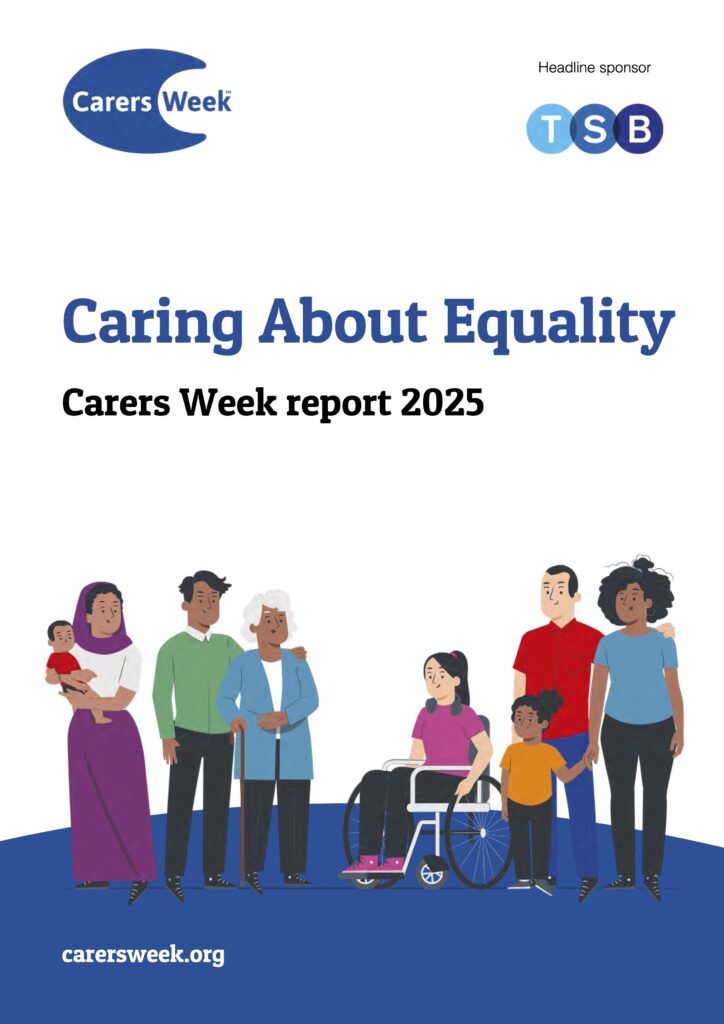Home > LBS backs Carers Week report calling for more support for unpaid carers

A new Carers Week report has found millions of unpaid carers feel disadvantaged and are unable to prioritise their own health needs and struggle with employment.
Many people looking after disabled, older or ill relatives have developed mental and physical health conditions since they started caring or need support to stay in paid work and progress in their career.
Lewy Body Society is backing Carers Week to increase visibility and raise awareness of the inequalities carers face.
We are the only official dementia charity supporter of UK-wide awareness campaign, along with Carers UK, Age UK, Carers Trust, MND Association, Oxfam GB, Rethink Mental Illness, and The ME Association.
Jacqui Cannon, chief executive of the Lewy Body Society, said: “We recognise the vital role unpaid carers play in the lives of people with dementia, often at much cost to themselves. Lewy Body Society supporter Paul Stone has movingly shared his own experiences in this year’s Carers Week report to help increase understanding of the caring experience.”
Research for Carers Week 2025 has found that 43% of current or former carers – an estimated 10.7 million people – have seen a mental or physical health condition develop or become worse since taking on a caring responsibility for someone. This figure is higher again for current carers at 48%.
Following a poll of over 2,000 members of the public, over half (58%) of current and former carers said they felt they were at a disadvantage as they are not able to look after their own physical or mental health in the same way as those without caring responsibilities.
The 2024 GP Patient survey in England asked people whether they had any long-term physical or mental health conditions, disabilities or illnesses. 70% of carers said they did, compared to 59% of non-carers.
Helen Walker, chief executive of Carers UK, said: “Sadly, carers still face significant inequalities. If you are caring for someone it’s likely that you will experience poorer health, financial strain, challenges accessing employment and education opportunities and be at greater risk of loneliness and isolation.
“It can be a negative cycle for many carers who experience worsening physical or mental health and are unable to take a break to look after themselves. The impact of this can be long-lasting, but we know that change is possible – from the Government investing more in support for unpaid carers and the NHS having clear measures of help for carers, to rights at work and support within education.
“So often carers feel invisible and overlooked, but we can all make a difference by caring about equality and taking action to recognise and support unpaid carers.”
This latest research for Carers Week confirms that many lack the support they need to look after their own health alongside their caring role. 39% of current and former carers who had a health condition develop or become worse said that being able to take regular breaks from caring would have helped prevent this.
40% of current carers said they had postponed or cancelled a medical appointment, test, scan, treatment or therapy because of caring, with 44% cancelling appointments saying they couldn’t find appointments at a time they could attend.
Current and former carers said they couldn’t find appointments at a time they could attend (39%) they didn’t have the support they needed to attend (30%), and they were unable to find affordable, available replacement care services (24%).
The report also found that a higher proportion of female current and former carers said they face disadvantages with their health compared with males (64% compared with 52%).
TSB Bank sponsors Carers Week 2025, which is also supported by Regina UK and Centrica.
Scroll to page 30 in the Carers Week report to read Paul’s story
To receive regular news updates, resources, events and breakthroughs in the fight against Lewy body dementia please enter your email address….
We will only contact you in relation to latest news & updates that we think will be of interest to you. We will not disclose your information to any third party and you can unsubscribe from our database at any time.
© 2023 The Lewy body Society. Registered Charity No: 1114579 (England and Wales) and SC047044 (Scotland). Website by ATTAIN